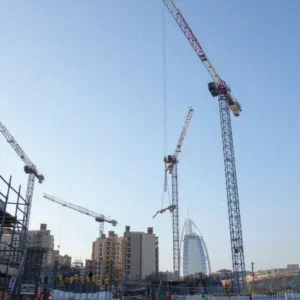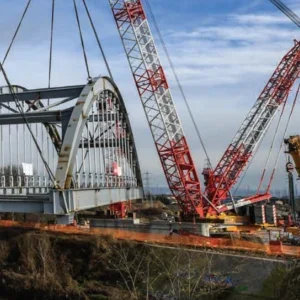Georg Frey is maintaining the relentless travel itinerary of his predecessor. He paid a flying visit to the Crane Industry Council of Australia (CICA) annual convention in Adelaide in September, which is where he tells us: ‘Like Mr Bär I believe that I can learn the most from talking directly to crane buyers all around the world. ‘ Global demand for mobile cranes is in decline but Frey is hopeful that it is beginning to stabilise. He says: ‘Last year was an excellent year for us with sales of 1,200 new cranes, which gave us a share of about 45% of the worldwide AT market of about 2,700 units. This year demand went backwards by between 15% and 20%. There is a great deal of uncertainty in the market. Of course there is the issue of Iraq. Then there is the question of the US dollar. So if it stays at this level in 2003 we will be happy.’
Frey joined Liebherr from a company that makes textile machinery. As a newcomer to the crane industry, with a fresh view, does he see opportunities for changes at Liebherr Ehingen? ‘I think that continuing the successful way that our business has developed is definitely the thing to do. We must continue to build good cranes, invest heavily in R&D, build and enlarge our worldwide sales and service organisation. We have won a 45% share of the world market with this policy and I have no intention of changing the direction of the company.’
He also plans to continue the policy of embracing the crane reconditioning business. ‘This has become a very important part of our business over the past 10 years. We completed a new facility at Ehingen for reconditioning second-hand cranes and now have two similar facilities in Germany – Berlin and Oberhausen. We have just finished building a reconditioning workshop in France and are building similar facilities in Houston, Texas and in the UK that will open next year. We will also build a reconditioning centre in Italy.
‘Reconditioning our own cranes has become a very important business for us. Last year we sold our 5,000th second-hand crane. We are by far the largest second-hand crane seller in the world and I must say it has proven to be our most important strategic development in recent years.’
New product development is also continuing as before. ‘This year we introduced the new 45t LTM 1045/1, the 350t LR 1350/1 crawler crane and in reality the long boom 250t LTM 1250/1 was introduced this year,’ Frey says.
‘In 2003 we will introduce three new cranes. You already know about our new 50t LTC 1050 compact crane which is not just a new crane but introduces new technology. That will go into prototype testing early next year and will be a very strong lifter.
‘Our crawler crane business has grown to become very important to us. Demag has dominated this sector in the past. We will continue to place increased emphasis on this area. Just before Conexpo we succeeded in winning an order for ten 350t and 400t crawler cranes from Mammoet and are right now negotiating more business with them. You will see more new, larger size crawler cranes from us in the future.’
He is not without his own views, though.
‘Of course I’m new to this business and I’m still learning, but I’m sure that the most important area to focus upon is the lifting performance of the crane. Without doubt this must be the first priority of the crane designer. Sometimes you hear people talk about making cranes more compact – of saving 20cm length in a vehicle that is 20m long. That is not making a machine more compact. Saving 2m on a 20m vehicle – now that is making it more compact.’
Under Frey, Liebherr Ehingen will continue its policy of seeking technological leadership, but he also recognises that rental rates on smaller cranes have been unsatisfactory for a long time. ‘It might be possible for us to build simpler, lower cost cranes but that could not be done in Ehingen,’ he says. Liebherr Ehingen’s efforts will be focused on offering the most modern technology for reasonable prices, says Frey.
The retirement of Freddie Bär after 30 years at the helm is quite a change for Liebherr Ehingen, but it is nothing compared to the changes going on elsewhere in the crane manufacturing industry. What does Frey make of the recent consolidation? ‘We can now say that there are three and a half major players in this business plus some smaller companies. It will be increasingly difficult for the smaller companies to survive. In this business you need a certain critical mass to provide service and support to customers all around the world. Providing a high level of customer service on a worldwide basis and continuing to develop new products is very costly.
‘Obviously every takeover is a challenge for the companies making the takeover such as Manitowoc and Terex. The bigger the organisation being taken over, the more complex the issue. Both Manitowoc and Terex have a lot of internal work to do. Thankfully we have no such issues that we have to deal with and can concentrate all our efforts on serving the market. We are there for our customers and have to intensify our worldwide sales and service support of our customers.
‘The most important thing for us is to continue the good work that has brought us a 45% share of this business. For me, following Mr Bär is a terrific challenge. His reputation worldwide is extraordinary. I have my own ideas but I will introduce them in harmony. I do not believe in a disruptive approach. I am a strong believer in natural development, not of breaking things up. But we must work faster and better. That is clear, faster and better.’






